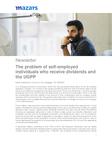
The problem of self-employed individuals who receive dividends and the UGPP
In a changing economic environment, where the only permanent thing seems to be the constant regulatory changes, it is normal to see people wondering what the most convenient legal and tax structure should be to manage their business and income. There is no doubt that, in order to manage businesses, due to the risk involved, the ideal structure is the use of a corporation, since in this way the shareholders limit their liability to the amount of their contributions and the company simply assumes all the commercial risk. The question that arises then is whether it is more convenient for a natural person, who is independent and only receives dividends, to manage his income as a company or as a natural person.
In tax matters, natural persons have a different system of income taxation than legal persons. In this system, the different incomes are taxed depending on their nature, so different tax credits are created (pensions, labor income, capital income, dividends and other non-labor income) where the different incomes are liquidated, being able in each of them to take certain tax benefits, deductions and exempted incomes until the tax payable is purified. In the dividends tax return, it is not allowed to purify the income with any type of deduction or exemption, reason for which the total amount of the same will be the basis for the calculation of the tax, which will be taxed at the rate of 35% in case of having distributed it as taxable for the shareholder, plus the dividend tax (0%, 5% and 10% depending on the amounts distributed).
In parafiscal matters, according to Law 1753 of 2015, self-employed individuals, such as capital rentiers and self-employed individuals with a contract other than the provision of services who receive monthly income equal to or greater than 1 SMLMV, will contribute to the Comprehensive Social Security System on a minimum contribution base income (IBC) of 40% of the monthly value of their income. Although such minimum base could be reduced with the deduction of the expenses necessary for the production of the income, since they are dividends, they do not exist. Likewise, since the dividends tax return does not allow subtracting any deduction, it is not possible to subtract from it the value of the contributions paid to the Social Security System. This generates a situation of double fiscal and parafiscal taxation, since the State profits doubly from the same economic fact (receipt of dividends) because the tax payable cannot be deducted with the parafiscal expense imposed by law.
Now, if instead of receiving the dividends directly, the individual were to incorporate a company (it could be a sole proprietorship) and contribute to it the shares that produce the dividend, such company would receive such dividends as an income not constituting income and, of course, would not be obliged to make contributions to the social security system for the amounts received. In this sense, the tax and parafiscal savings that the individual would have would more than compensate the fixed costs of having a corporation (accounting, renewal of commercial registration, among others), and it could be kept safe from the Pension Management and Parafiscal Contributions Unit (UGPP).


